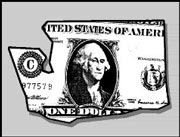IT’S OFFICIAL—we’ve got ourselves a recession.
That’s the word from the National Bureau of Economic Research, a panel of six eminent academic economists that met last week to make the call. The Gang of Six also gets to retroactively choose a recession starting point—they decreed it commenced in March.
Local economists could have told you the same thing: Roberta Pauer, a regional economist with the Washington Employment Security Department, says a recession is defined as a contraction of the economy (not just a no-growth period) in which revenues fall, employment drops, and a wide spectrum of businesses are affected.
Generally, for the Puget Sound area, a recession is signaled by two factors: a national recession (which we’ve got) and a big Boeing downturn (ditto). Seattle economist Dick Conway says poor economic prospects at Boeing, which has some 80,000 employees locally, “tends to make the difference” in bringing down the local economy. Factor in the Sept. 11 terrorist attacks, which hurt an already ailing Boeing, and the bust of the dot-coms, and you’ve got a recipe for hard times in the Jet City (also see “Boeing Bust,” p. 23).
Would we be in a recession had the attacks not occurred? Probably, says Conway, who notes that Boeing had already cut some 26,000 jobs in the previous three years. “We were on the edge of recession in February, fell into it in the spring, and Sept. 11 made matters worse,” he says.
Bad economic conditions in Asia over the past couple years also contributed to a sluggish export market and led to the elimination of Northwest manufacturing jobs, says Pauer. “Normally, our trade status is considered a strength, but it turns into a weakness when the partners we trade with go into recessions.”
The Seattle metro labor market (defined by the federal government as King, Snohomish, and Island counties), saw pronounced job growth in the last half of the 1990s but is going to shed jobs next year, according to Pauer.
Washington state currently has the nation’s highest unemployment rate at 6.6 percent (the national rate is 5.4 percent). While it’s not unusual for Washington to be among the leaders in this department (our large number of seasonal jobs in farming and forest industries generally keeps us about a percentage point above the national rate), things are probably going to get worse before they get better, says Chang Mook Sohn, state government’s chief economist. He projects that Washington unemployment will rise slightly in the next year and a half, peaking at 8 percent in mid-2003. State government will feel the pinch—public revenues in the current biennium will probably remain flat or even go down slightly for the first time. In April, the Seattle City Council was told its three major tax sources would raise $572.2 million in 2002; by November that number had plunged to $534.7 million. A record number of Western Washingtonians, 23,000, filed for bankruptcy in the first 10 months of 2001, according to federal court data.
HOW DOES the tech sector figure into all of this? “That arena is sort of at zero in terms of job growth,” says Pauer (translation: Microsoft is still expanding—everyone else is contracting). “For it to be at zero still constitutes a collapse of the bubble, and here’s why—for the last four years, that sector grew at 15 to 20 percent per year.”
Tracking tech jobs is tough work for economists, she adds, because many of the dot-coms were basically retail businesses (such as Amazon.com) or were seeking to profit by selling services or Internet advertising. Three sectors— computer services, communications, and electronic manufacturing—comprise about 102,000 of the Seattle labor market’s 1,420,000 jobs.
A few reasonable indicators of the power of the computer: During the 1997-2000 dot-com boom, the Seattle labor market’s unemployment rate hovered just over 3 percent at a time when the state rate never got below 4.7 percent. In 1997, computer-saturated King County’s median household income was $52,800 as compared to $43,600 statewide; by 2001, the King County median was up to $62,700, while households statewide lagged behind at $50,700.
But if any of the losers at dot-com Lotto are looking for sympathy, don’t try crying on the shoulder of an economist. The combination of overvalued stocks, undiscerning venture capitalists, and the general feeling that Internet-related businesses could succeed without making a profit meant the dot-com boom was destined to be followed by a dot-com bust, says Pauer. The slacker mentality of the computer generation also worked against the long-term business prospects of these businesses. Thousands of young, talented people hooked up with dot-coms with the intention of working for two or three years, cashing out, and going sailing—hardly the standard profile of successful, long-term business ventures.
The dot-economy was also propped up by an overheated stock market, Pauer says. Investors grew suspicious of the speculative nature of the businesses they were investing in, so stock values on the Nasdaq exchange plunged in early 2000, she notes. “When that bubble burst, it caused massive loss of valuation, and it caused venture capitalists to pull out and to restrict cash flows to firms, and firms close and they lay off and they vacate real-estate space.”
Economists talk that way because the economy works that way. Laid-off Boeing workers can’t afford to eat out, so restaurants buy less food from suppliers, those businesses put off plans to hire new workers, and so on and so forth. In this way, a recession “snowballs,” says Conway.
Although Conway, co-publisher of the influential quarterly Puget Sound Economic Forecaster, agrees with most economists that better economic times will be arriving by early 2004, he also concurs that the bad times will be pretty bad. “There’s still a lot of questions out there,” he says, “and if you’re feeling gloomy these days, a lot to worry about.”
Additional reporting by Rick Anderson.






